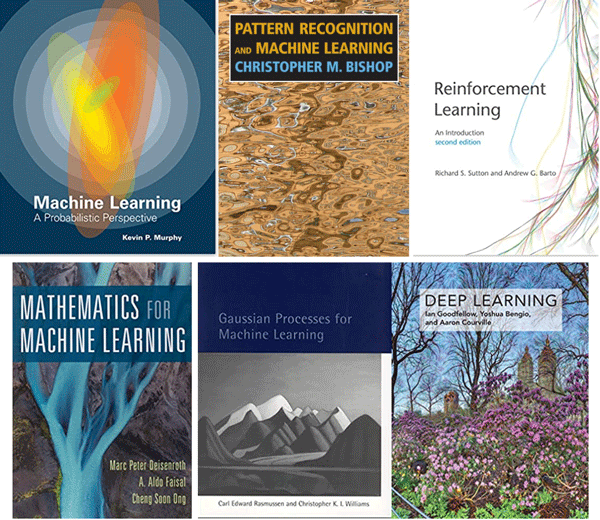![[object Object]](/_next/image?url=https%3A%2F%2Fcdn.sanity.io%2Fimages%2Fei1axngy%2Fproduction%2Ff83f8e24d1fb84d1211763941d7874ed6b2a2da8-281x285.jpg&w=256&q=75)
by Prof Tim Dodwell
Updated 22 December 2022
Get a Machine Learning Job in 2023 - Six Top Machine Learning Books
![[object Object]](/_next/image?url=https%3A%2F%2Fcdn.sanity.io%2Fimages%2Fei1axngy%2Fproduction%2F945cccf705931ebf65630f797c33d0cfc13d210a-600x300.png&w=2048&q=75)
Many will be thinking about getting their first Machine Learning job in 2023 - it is still the fastest growing job sector, being computer based it offers the potential for flexible or hybrid working, and on average entry-level Machine Learning jobs pay 150% more than the equivalent positions in engineering.
So what is the strategy for improving your chances? There is lots of good things you can do:
-
Do an online course in machine learning, get the fundamentals right.
-
Start your own Machine Learning project! Could be a Kaggle challenge, or could be your own defined project.
-
Find a Machine Learning or data science internship, nothing beats experience - or as we call it “AI in the Wild”.
These are all really good ways to move forward in your Machine Learning journey - and we articles covering each going forward. But sometimes you just need a good book!
When I started my PhD I remember my supervisor telling me on the first day “Don’t read too much!”. I admit this was a surprise for a new PhD student, when I was expecting to bury my head in books for the first 6 months. It was a good strategy though. Machine Learning is a practical subject, and progress needs to be made by wrangling your own data, training and validating your own models - and getting stuck! However, I would alter my PhD supervisor's advice to “Read a few very good books”.
Here is my list of 6 Machine Learning books I would suggest any of our machine learning engineers at digiLab (or people seeking a Machine Learning Engineering job) to read.

Figure. Top machine learning books
Machine Learning : A Probabilistic Perspective by Kevin Murphy
Should be titled "What every ML engineer at digiLab should know!" - a real go to reference covering all major methods. Style covers methods in detail with rigour, but written to be made accessible via lots of examples. The book’s web page provides a free pdf copy and lots of snippets of code to implement methods and examples. Can be picked up as a reference, or followed section by section in a self-curated advanced Machine Learning course.
Pattern Recognition and Machine Learning by Christopher Bishop
This is a real classic textbook in Machine Learning. I am probably biased, but I feel this book gives a really good introduction into Bayesian Machine Learning, which often is not the case. It is more involved than other books, so less suitable for someone without a mathematical background, or perhaps you should consider looking at “Mathematics for Machine Learning” (below) first or at the same time.
Reinforcement Learning : An Introduction by Sutton & Barto
This book is very different from the other books in this list. I have included it here as it is the textbook in Reinforcement Learning (RL). Other books in the list cover supervised and unsupervised learning methods well, but RL is some-what different. The book and associated website gives lots of nice examples, including code. The book walks through value-based and policy-based methods, and shows a clear connection with neuroscience backgrounds - a must and super cool!
Mathematics for Machine Learning by Deisenroth, Faisal & Ong
For those that don’t come from a mathematics background this is a very good (focused) resource on what you need to know to be effective in a Machine Learning job. The book provides a great “need to know” guide to Linear Algebra, Analytic Geometry, Vector Calculus and Probability, before getting into more applied examples around optimization and regression. Lots of nice simple examples, very easy to read and good to learn alongside “Learning Python for Machine Learning”.
Gaussian Processes for Machine Learning by Rasmussen & Williams
Gaussian processes (GPs) provide a principled, practical, probabilistic approach to learning in kernel machines. Yet when compared to Neural Networks or Random Forests, Gaussian Processes are a much less known machine learning methodology. Having said this, Gaussian Processes are highly effective in cases where data is sparse, noisy and expensive to acquire additional data.
Whilst Gaussian Processes are built from foundations in Bayesian statistics, this book comes at it from a different angle, more suited to those with a background in Generalized Linear Models (see Murphy’s book for an introduction). I believe this makes GPs more accessible to those without a strong statistical background. Moreover, the book does a good job of connecting GPs with other Machine Learning algorithms, including support-vector machines, neural networks, splines, regularization networks, relevance vector machines and others.
The website provides a free pdf of the book, and code (whilst in Matlab) for most examples in the book.
Deep Learning by Goodfellow, Bengjo & Courville
A must have for machine learners - focuses on theoretical foundations and practical deep learning in equal measure. In particular the third part of this book is dedicated to deep learning research, and consists of a very nice introduction to state-of-the-art generative algorithms. In general the book requires some background in mathematics, and for those needing support will require other supplementary math background (Mathematics for ML is perfect for this - see above). The book from a style / readability perspective is not as clear as Probabilistic Machine Learning by Murphy - so recommended for the more experienced practitioner.
Train, Validate and Deploy Trustworthy Machine Learning Models
Our twinLab platform accelerates your time-to-value when building, validating and deploying Machine Learning models by orders of magnitude, and even makes unsolvable problems, solvable.
To find out more, get in touch with the twinLab team and book a demonstration of digiLab’s Machine Learning platform today.
digiLab Academy: Learn "AI in the Wild"
In 2023, we are launching the digiLab Academy. Our first course, “AI in the Wild”, will enable engineers in industry to apply Machine Learning methods to their real-world problems, quickly and efficiently. The course will be based around twinLab, our no-code ML platform.
Featured Posts
If you found this post helpful, you might enjoy some of these other news updates.
Python In Excel, What Impact Will It Have?
Exploring the likely uses and limitations of Python in Excel

Richard Warburton
Large Scale Uncertainty Quantification
Large Scale Uncertainty Quantification: UM-Bridge makes it easy!

Dr Mikkel Lykkegaard
Expanding our AI Data Assistant to use Prompt Templates and Chains
Part 2 - Using prompt templates, chains and tools to supercharge our assistant's capabilities

Dr Ana Rojo-Echeburúa